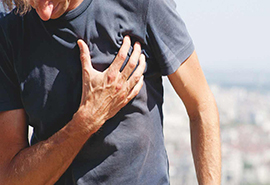
The Heart Attacks
What happens in a heart attack?
A heart attack takes place when there's a blockage in artery supplying the vital organs (heart) with blood and oxygen, damaging the heart muscle. Generally, chest pain occurs for more than 15 minutes. However, heart attacks it can also be silent with no apparent symptoms or warnings e.g. pain, but in many cases the warning symptoms can be hours, days or weeks in advance.
Indicators of a heart attack:
- Frequent chest pain generated by physical exertion and calmed by rest can be the best sign of an attack; it could last for several minutes or be on and off. For example, uncomfortable pressure, fullness or squeezing pain in the center of the chest.
- Lingering pain in the above the stomach, shoulder or arm.
- Discomfort spreading to the shoulders, neck, jaw, teeth, or one or both arms.
- Shortness of breath.
- Lightheadedness, dizziness, fainting.
- Sweating.
- Nausea.
What to do when having a heart attack?
- Try to keep calm, don’t panic.
- Take medication if any. If you had been previously prescribed nitroglycerin, take it as directed and do not use anyone else' prescription.
- If allowed, chew and swallow an aspirin.
- Call for emergency medical assistance (Dial 997). If there is no assistance have someone drive you to the hospital, the first five minutes are critical. Try not to drive yourself unless it is the last option.
- If the person is unconscious, inform the medical help and follow CPR procedures. If you don't have CPR training, doctors recommend skipping mouth-to-mouth to directly perform chest compression. Continue until medical help arrives.



